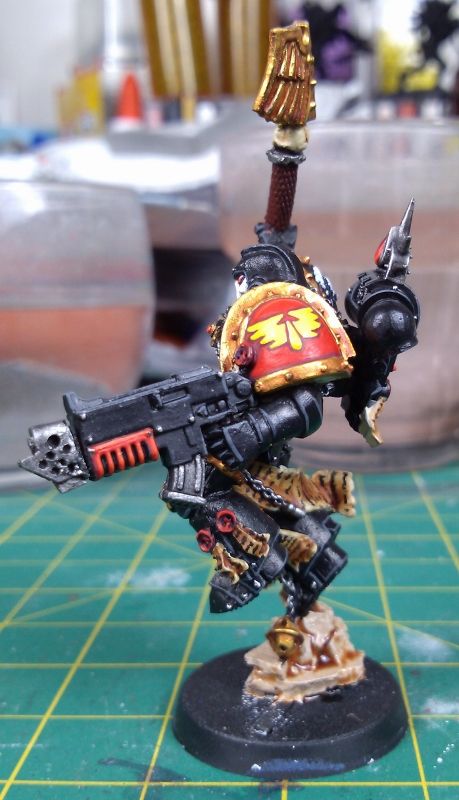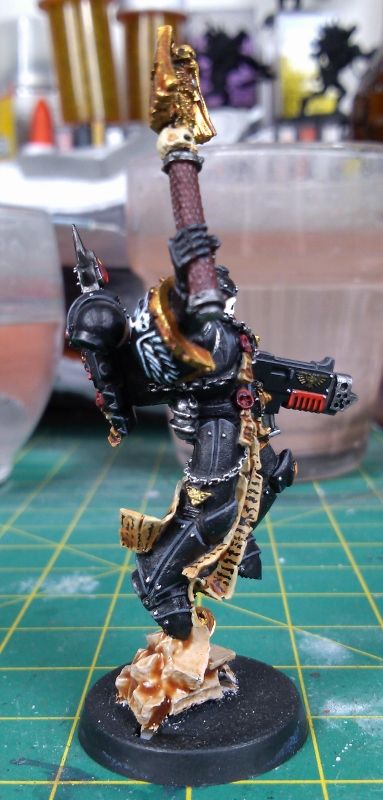A few months ago JJ over at "How to lose at 40k" put up an offer, make him a banner for his website and he would paint up a mini in trade. After a few emails back and forth I managed to meet his expectations and create a banner design he was happy with. For my mini I asked for a single Death Company Chaplain is exchange. I have been following JJ and his progress over the last year when he started his blog and I thought that I would at least challenge him a bit with the project. Here is the result:
I am putting this gun into a Death Company squad which will all have custom bases, so I let him know that a plain base was fine.
I specifically wanted a Forgeworld type combi-flamer, scratch built (to challenge him a bit). Not only did he get that part perfectly, he free handed the blood angel symbol on the shoulder.
On the scroll work everything is done with minute attention to detail and all the test runs in clear lines.
All the highlights are thin and well done, this is truly an excellent addition to my budding Death Company and I greatly appreciate all the work that went into it. An excellent trade for my work on his banners, and something that a great many people could have taken advantage of!
Now I am not normally one to pimp for other people but JJ has treated me right, and the photo speak for themselves. I would encourage anyone who might be interested in getting some painting done to go over and check out his rates, hes quite reasonable in comparison to some of the other services out there and the quality is just as good (in my ever so humble opinion). His site is here:
Silver Gargoyle Productions
_still practicing
T
Monday, July 15, 2013
Monday, July 8, 2013
Was ist der Boogeyman?
My
last article gave rise to some questions about the concept of the boogeyman,
and yes – for you readers in England we did add an extra O to the word! So, what
is a boogeyman? In its most basic form a boogeyman is simply a shiny object
used to attract attention. A perfect, and very recent, example of a boogeyman either the Wraithknight
or the Riptide. Both of these units are intimidating on the table top because
of their size in comparison to other models and they are both durable because
of their high toughness and wounds. Both of these units are fast on the tabletop
and they both pack a fairly lethal arsenal of weapons. So why are both of these
very good examples of boogeymen?
Thursday, July 4, 2013
Independence Day 2013: Facts and Stuff
1.) We Are Not a Democracy: People often associate democracy with
freedom. We hear this word used all the time by our politicians, by our
neighbors, even sometimes by our educators. But the fact is we are not a
democracy. We are a republic. Our Founding Fathers deemed this an
important distinction to make and discussed the matter quite a bit. In
the end, our Founding Fathers claimed that a democracy was both extreme
and dangerous for a country as it would most assuredly result in the
oppression of the minority by the majority. Take this one example from
Founding Father, Elbridge Gerry: "The evils we experience flow from the
excess of democracy." And Thomas Jefferson said that democracy should
never be practiced outside the limits of a town. Our Founders were very
wary of power no matter who had it and thus limited it as much as
possible -- this is why we have such a unique system of checks and
balances.
2.) Our Founding Fathers Would Not Have Recited the Pledge: Another patriotic tradition that gets a lot of attention, particularly around this time of the year, is the Pledge of Allegiance. The Pledge did not exist during our Founders' lifetimes -- something that is very clear when looking at its text. The Pledge was written over a century after America's founding in 1892. It was also written by a socialist -- Francis Bellamy, whose original text was: "I pledge allegiance to my Flag and the Republic for which it stands, one nation, indivisible, with liberty and justice for all." According to our Founders, the states are not indivisible, but very much the opposite. In fact, when ratifying the U.S. Constitution, some states, such as Virginia among others, specifically declared the right to secede from the Union should they feel it necessary just as an extra precaution to make sure that that state right was understood. Our Founders took their states rights very seriously and considered the U.S. Constitution to be a compact amongst the sovereign states so that any state could secede if it felt the federal government had become oppressive. So, if not with a pledge, how would our Founding Fathers begin meetings and celebrations? The answer: most likely with a prayer. In fact, the very first resolution brought before the First Continental Congress, and immediately passed, was the declaration that they would open every meeting with a prayer.
3.) The Midnight Ride of Paul Revere . . . and 40 others? The mythology of Paul Revere's midnight ride can be traced back to the year 1860 with the writing of that famous poem, "Paul Revere's Ride." Here's what really happened: On April 18, 1775, British troops were ordered to arrest John Hancock and Samuel Adams, both of whom were in Lexington at the time and to seize arms and provisions at Concord. Upon hearing this, Paul Revere and William Dawes set out on horseback -- taking two different routes to Lexington in order to warn Hancock and Adams. Along the way, they warned the towns they passed through of the British invasion. By the morning of April 19 roughly 40 men were out on horseback spreading the news. Revere arrived at Lexington first, followed by Dawes. The two men then headed toward Concord, but were intercepted by British troops. Dawes, though injured, managed to escape, but Revere was captured. He was rescued by American militiamen a short while later. It was during this confrontation between British troops and American militiamen at Concord that the famous shot heard 'round the world was fired.
So this July Fourth, research what you're celebrating and talk about it with your family. Benjamin Franklin said that we have Republic, if we can keep it. Former Congressman and author of the book "In Tune with America: our History in Song," George Nethercutt Jr. put it this way: "The foundation of the freedoms we enjoy as Americans is the U.S. Constitution, the longest surviving constitution of any nation in history. To be civically unaware is to diminish our freedom, but knowing our history makes us all better Americans. Read our nation's Founding documents and they will inspire you."
2.) Our Founding Fathers Would Not Have Recited the Pledge: Another patriotic tradition that gets a lot of attention, particularly around this time of the year, is the Pledge of Allegiance. The Pledge did not exist during our Founders' lifetimes -- something that is very clear when looking at its text. The Pledge was written over a century after America's founding in 1892. It was also written by a socialist -- Francis Bellamy, whose original text was: "I pledge allegiance to my Flag and the Republic for which it stands, one nation, indivisible, with liberty and justice for all." According to our Founders, the states are not indivisible, but very much the opposite. In fact, when ratifying the U.S. Constitution, some states, such as Virginia among others, specifically declared the right to secede from the Union should they feel it necessary just as an extra precaution to make sure that that state right was understood. Our Founders took their states rights very seriously and considered the U.S. Constitution to be a compact amongst the sovereign states so that any state could secede if it felt the federal government had become oppressive. So, if not with a pledge, how would our Founding Fathers begin meetings and celebrations? The answer: most likely with a prayer. In fact, the very first resolution brought before the First Continental Congress, and immediately passed, was the declaration that they would open every meeting with a prayer.
3.) The Midnight Ride of Paul Revere . . . and 40 others? The mythology of Paul Revere's midnight ride can be traced back to the year 1860 with the writing of that famous poem, "Paul Revere's Ride." Here's what really happened: On April 18, 1775, British troops were ordered to arrest John Hancock and Samuel Adams, both of whom were in Lexington at the time and to seize arms and provisions at Concord. Upon hearing this, Paul Revere and William Dawes set out on horseback -- taking two different routes to Lexington in order to warn Hancock and Adams. Along the way, they warned the towns they passed through of the British invasion. By the morning of April 19 roughly 40 men were out on horseback spreading the news. Revere arrived at Lexington first, followed by Dawes. The two men then headed toward Concord, but were intercepted by British troops. Dawes, though injured, managed to escape, but Revere was captured. He was rescued by American militiamen a short while later. It was during this confrontation between British troops and American militiamen at Concord that the famous shot heard 'round the world was fired.
So this July Fourth, research what you're celebrating and talk about it with your family. Benjamin Franklin said that we have Republic, if we can keep it. Former Congressman and author of the book "In Tune with America: our History in Song," George Nethercutt Jr. put it this way: "The foundation of the freedoms we enjoy as Americans is the U.S. Constitution, the longest surviving constitution of any nation in history. To be civically unaware is to diminish our freedom, but knowing our history makes us all better Americans. Read our nation's Founding documents and they will inspire you."
Subscribe to:
Posts (Atom)






